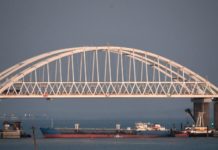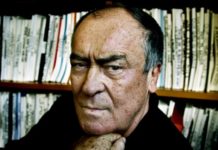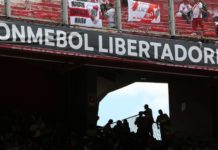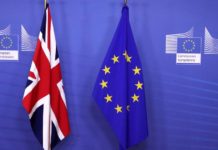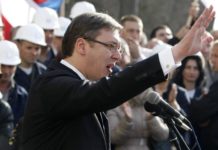Iran, Russia and Turkey agree on reducing risk of ethnic divide in Syria
As Turkish, Russian and Iranian foreign ministers hold talks in Astana, they agree that Syria’s future must be secured “without outside political interference,” and underlined the need for humanitarian access to the areas affected by the conflict.
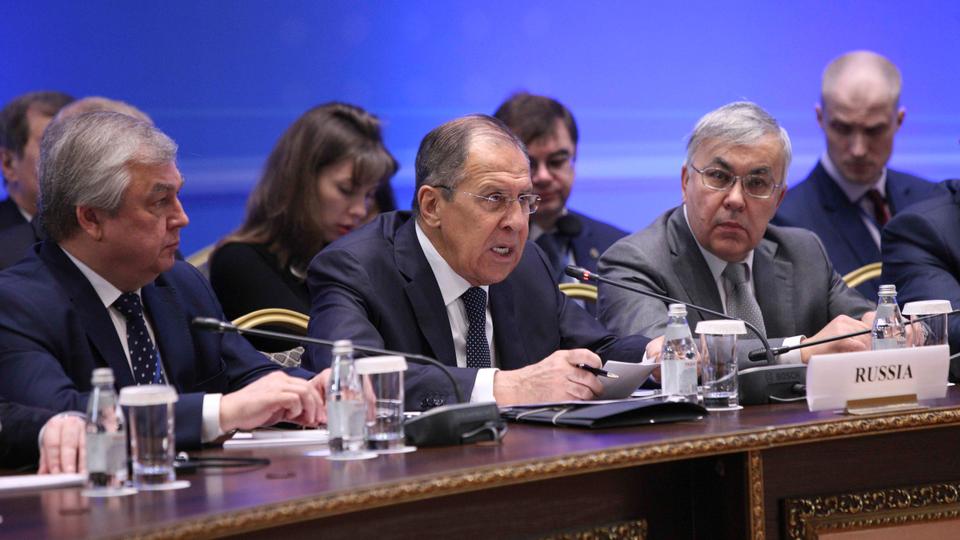 Russian Foreign Minister Sergey Lavrov (C) speaks during the international meeting on Syria in Astana, Kazakhstan March 16, 2018. (Reuters)
Russian Foreign Minister Sergey Lavrov (C) speaks during the international meeting on Syria in Astana, Kazakhstan March 16, 2018. (Reuters)
The foreign ministers of Iran, Russia and Turkey held talks on Syria in Kazakhstan on Friday, almost a month after the Moscow and Tehran-backed regime began pounding an opposition enclave just outside of Damascus.
The dire humanitarian situation in eastern Ghouta, a suburb of the Syrian capital, was on the agenda as Mevlut Cavusoglu of Turkey, Sergey Lavrov of Russia and Mohammad Javad Zarif convened in the Kazakh capital, Astana, on Friday.
The other de-escalation zone, Idlib, where the clashes are continuing between the rebels and regime forces, was also on the agenda.
TRT World‘s Hasan Abdullah reports.
Focus on Syria’s territorial integrity
Speaking at the outset of the talks Friday, Lavrov said that “millions of Syrians are looking in the direction of Astana” as the three power brokers work towards an end to the conflict. “Turkey, Russia and Iran support territorial integrity of Syria as guarantor countries of peace talks,” he added.
The meeting is expected to lay ground for a summit involving the presidents of the three countries in Istanbul on April 4.
The three ministers discussed the latest humanitarian, security and political situation in Syria, including efforts at alleviating the humanitarian situation, fighting international terrorist groups, observance of ceasefire agreements and taking measures to reduce violence on the ground.
A joint press release from the talks underlined the unity and territorial integrity of Syria, as well as agreement on the need to reduce the risk of ethnic and sectarian divide.
Joint Statement by the Ministers of Foreign Affairs of the Islamic Republic of Iran, the
Russian Federation and the Republic of Turkey on Syria
(Astana, 16 March 2018)
The Ministers of Foreign Affairs of the Islamic Republic of Iran, the Russian Federation and the
Republic of Turkey, as guarantors of the observance of the ceasefire regime in Syria, gathered in Astana on 16 March 2018 at the invitation of the Republic of Kazakhstan in order to take stock of their trilateral cooperation since the first International Meeting on Syria in Astana held on 23-24 January 2017 and
1. Highlighted the current high level of tripartite coordination on implementing the provisions of the Joint Statement by Presidents of Iran, Russia and Turkey of 22 November 2017 in Sochi;
2. Agreed to continue the effective interaction that would have positive effect on the situation in Syria and the entire region and reduce the risk of ethnic and sectarian divide;
3. Took note of the upcoming Trilateral Summit which would be held in Turkey on 4 April 2018;
4. Expressed their satisfaction with concrete contribution of the Astana process to
improvement of the situation in Syria during the last year, emphasizing in this regard the success of their collective efforts in the fight against international terrorism, particularly the defeat of ISIL in Syria and the creation of favorable conditions for the political settlement on the basis of the UN Security Council resolution 2254;
5. Emphasized that the Astana format and its achievements had become an effective instrument for contributing to peace and stability in Syria;
6. Expressed joint determination to continue their coordinated efforts with a view to ensuring that the progress in the reduction of violence on the ground wasirreversible;
7. Reaffirmed their strong and continued commitment to the sovereignty, independence, unity and territorial integrity of the Syrian Arab Republic. They also highlighted that none of the actions, no matter by whom they were undertaken, should undermine these principles, confirmed by relevant UN resolutions and by the will of representatives of all segments of the Syrian society, clearly and unequivocally expressed during the Congress of the Syrian National Dialogue in Sochi;
8. Reiterated their conviction that there was no military solution to theSyrian conflict
and welcomed the progress achieved in eight high-level meetings held in Astana with a view to contributing to international efforts for ending the Syrian conflict through the adoption of measures to reduce violence on the ground, build confidence between the conflicting parties, alleviate the humanitarian situation and give impetus to efforts aimed at finding a political solution;
9. Took note of the state of implementation of the Memorandum of 4 May 2017 on the creation of the de-escalation areas in Syria, reaffirmed their determination to continue implementing its provisions with respect to all four deescalation areas and also emphasized that under no circumstances the creation of the de-escalation areas should undermine the sovereignty, independence, unity and territorial integrity of the Syrian Arab Republic;
10. Reaffirmed their determination to continue their cooperation in order to ultimately eliminate DAESH/ISIL, Nusra Front and all other individuals, groups, undertakings and entities associated with Al-Qaeda or DAESH/ISIL as designated by the UN Security Council in Syria and to prevent their relocation to other countries and regions;
11. Underscored the necessity to assist the Syrians in restoring the unity of their country and in achieving a political solution of the ongoing conflict through an inclusive, free, fair and transparent Syrian-led and Syrian-owned process leading to a constitution enjoying the support of the Syrian people, and free and fair elections with the participation of all eligible Syrians under appropriate UN supervision;
12. Welcomed the convening of the Syrian National Dialogue Congress in Sochi on 30 January 2018 as a major contribution giving momentum to the process of the political settlement under the UN auspices and reaffirmed their commitment to the results of the Sochi Congress, especially to form the Constitutional Committee and to facilitate the beginning of its work in Geneva with the assistance of the United Nations Secretary-General’s Special Envoy for Syria as soon as possible;
13. Called upon the representatives of the Government of the Syrian Arab Republic and the
opposition committed to the sovereignty, independence, unity, territorial integrity and non-fractional character of Syria as well as the international community to support the work of the Constitutional Committee;
14. Underscored the need to ensure rapid, safe and unhindered humanitarian access to areas affected by the ongoing conflict;
15. Expressed their concern with the ongoing violations of the ceasefire regime, and declared that, as guarantors of the ceasefire regime, they would step up their efforts to ensure observance of the respective agreements;
16. Welcomed the UN Security Council resolution 2401 in response to the grave humanitarian situation all across Syria, including in Eastern Ghouta,Yarmouk, Foua and Kefraya, Idlib Governorate, Northern Hama Governorate, Rukhban and Raqqa;
17. Expressed their readiness to continue efforts with a view to implement the provisions of
the above-mentioned resolution, aimed at strengthening the ceasefire regime and improving the humanitarian situation all across the Syrian Arab Republic, and called upon all parties to fully support this process, inter alia by sending additional humanitarian aid, facilitating humanitarian mine action, restoring basic infrastructure assets, including social and economic facilities, and preserving historical heritage;
18. Welcomed the convening of the first meeting of the Working Group on the release of detainees/abductees and handover of the bodies as well as the identification of missing persons on the eve of the Ministerial Meeting, and expressed their conviction that the efforts of the Working Group would further contribute to building confidence between the conflicting parties in Syria;
19. Expressed their sincere gratitude to the President of the Republic of Kazakhstan, His Excellency Nursultan Nazarbayev and the Kazakh authorities forsupporting the Astana process and hosting International meetings on Syria;
20. Decided to hold the next high-level International Meeting on Syria in Astana in mid-May 2018.
Astana, 16 March 2018
The Russian and Iranian officials also underlined that the future of Syria must be secured “without outside political interference.”
Astana Talks: Iranian Foreign Minister Javad Zarif says the future of Syria must be secured "without outside political interference" pic.twitter.com/CvpGoOBgcp
— TRT World Now (@TRTWorldNow) March 16, 2018




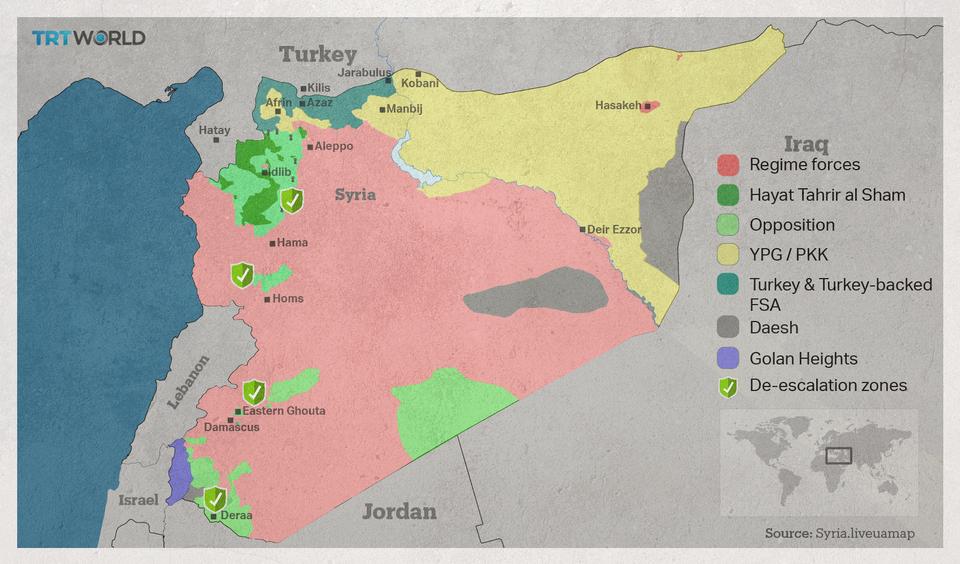 (TRTWorld)
(TRTWorld)